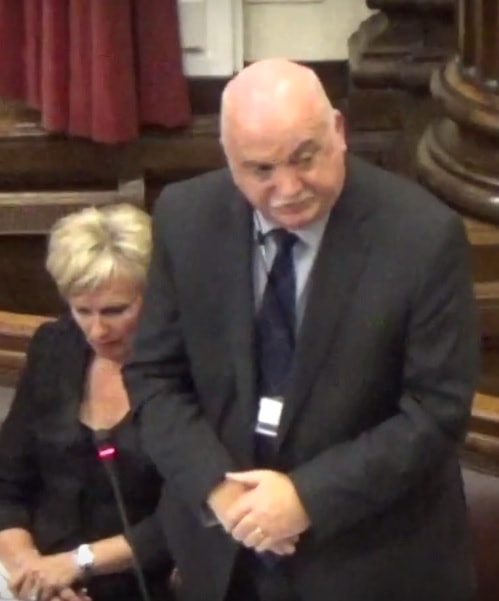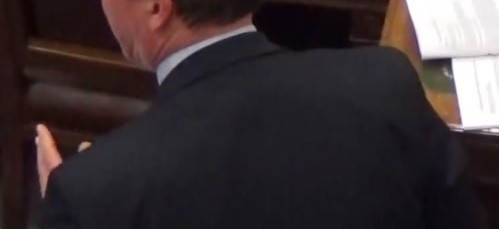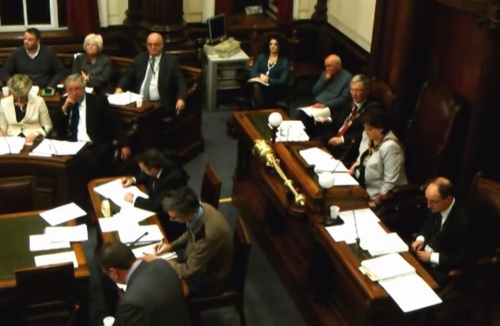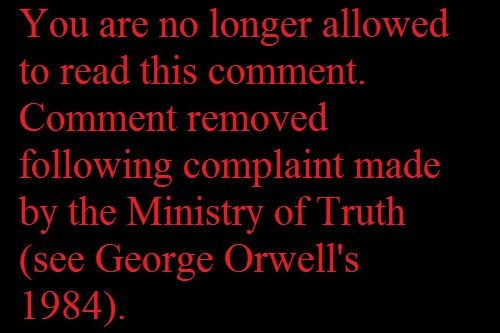What did councillors say about Girtrell Court before the meeting was adjourned?
Last week there was a debate at a public meeting of all Wirral Council councillors about whether the decision to close Girtrell Court should be made at a public meeting or behind closed doors.
I thought it would be useful (as there was uncertainty as to whether it would be discussed at all) to start a transcript of what was said during that debate.
The Conservative notice of motion on Girtrell Court can be read here (page 2 (motion 3)) and the Labour and Liberal Democrat amendments to it can be read here.
Please accept YouTube cookies to play this video. By accepting you will be accessing content from YouTube, a service provided by an external third party.
If you accept this notice, your choice will be saved and the page will refresh.
Council (Wirral Council) 14th March 2016 starting at 22m21s at the start of the debate on the Girtrell Court motion

Cllr Chris Blakeley Thank you Mr. Mayor.
Mr Mayor, I think tonight I’ll just ask a question of the Leader of the Council this evening, he can see the approach that we have on this subject, the people in the public gallery, who have repeatedly attended in the public gallery at meeting after meeting to make their views known.
Mr Mayor, I’m saddened that I have to bring such a notice of motion, in an effort to underpin the democratic rights of both elected Members and of course the public we are here to serve.
Mr Mayor on this particular issue which revolves around Girtrell Court, this matter goes further than that. It goes to the very heart of why we are here and why we are empowered by the electorate to make decisions in an open and transparent way and in the public arena. In committees, in cabinets and most importantly in this Council Chamber.
Last week Mr Mayor, the Labour Members in this Chamber voted to a person to allow a budgetary decision that can only be made by Council, a decision that will have a massive impact on the most vulnerable people in our care, to be made behind closed doors without any means of challenge by this Council or the people it affects.
Mr Mayor, I’ve scoured the constitution and I’ve got a number of pages here with regards to budget procedures and I simply cannot find anywhere where it says budgetary decisions that can only be made by Council can be delegated to a portfolio holder and an officer to be made at a future date in secret behind closed doors.
(shouts of hear, hear and applause)
Mr Mayor, if this is allowed in this case where will it end?
Mr Mayor, I refer to the Council’s constitution and the constitution is divided into sixteen articles which sets out the basic rules governing the Council’s business and it talks of the principles of decision-making which includes references to respect for human rights and a presumption in favour of openness. Article 1 of the constitution states, “The Council will exercise all of its powers and duties, in accordance with the law and this constitution.”
At (ii) in that it says it will, “support the active involvement of citizens in the process of local authority decision-making;”
and
section (v) states, “create a powerful and effective means of holding decision-makers to [public] account;”.
Mr Mayor, how can making a decision behind closed doors actively involve citizens and hold them to account?
Mr Mayor, section 2.3 states at (e), “All Councillors will be involved in decision making.”
Well Mr Mayor, if that’s the case, then why is that statement not being adhered to?
Article 4 deals with Council’s budget framework and states at the outset that, “the full Council will decide the Council’s budget and policy framework” . Section 4.2 states, “Only the Council will exercise the following functions:
[(i)] adopting and changing the Articles of the Constitution;
[(ii)] approving or adopting the policy framework, the budget and any application to the Secretary of State in respect of any Council land.”
Mr Mayor, again nowhere does it state that decisions on the Council’s budget can be delegated to individual portfolio holders, even in conjunction or not in conjunction with an officer.
Mr Mayor, I’ve looked at Phil [Davies]’ amendment and I have to say at the risk of destroying my street cred I agree with parts of the first paragraph. Yes, this is about people and it is about choice and Mr Mayor the people have made their choice. That choice Mr Mayor is Girtrell Court.
(applause)
Mr Mayor, it seems people can have a choice as long as they don’t choose Girtrell Court but Mr Mayor that’s not a choice!
The second paragraph tries to justify why a decision has to made behind closed doors. Mr Mayor, this is too important a matter and there is no justification for not making a decision in the public arena.
I’ve looked at the Lib Dem amendment, I have to say it is meaningless. It simply reinforces making the decision behind closed doors and then challenging it. It’s quite clear you know that we can’t really support that.
Mr Mayor, the proposal to close Girtrell Court has caught the attention of the public and in particular the users and loved ones, not just here but around the world Mr Mayor. People have signed the petition from Australia, America, Canada, all over Europe and Mr Mayor while it is one of the smaller savings, this is the issue that is the most devoted and has courted the most publicity in the public budget.
Mr Mayor, if this delegated decision is allowed to take place, then it fully means the Labour Group has changed the constitution without the authority of the Council.
Mr Mayor, the proposal to close Girtrell Court is ill thought out and ill-conceived. However, the very least the hundred and thirty-three families and the forty-five staff can expect is that any decision is made in the public arena and not in secret behind closed doors.
(applause)
Mr Mayor, it’s not too late for the Leader of the Council and his Group to listen to the people, to listen to the ten thousand people who’ve signed petitions, to listen to the hundred and eighty-nine people who had their say on the consultation and to give them that choice, the choice they want Girtrell Court.
(cheering and applause)
Mr Mayor, I urge the Council to support this motion.
(applause)
Mayor of Wirral Cllr Les Rowlands Cllr Phil Davies, you now have up to five minutes to move your amendment.

Cllr Phil Davies (Leader of the Council) Thank you Mr Mayor.
For this me, the key driver behind this decision is definitely, it’s running in step with more choice
(drowned out by heckling)
(Cllr Phil Davies sits down)
Mayor of Wirral Cllr Les Rowland Excuse me, excuse me. I want you to be here because I want to see this debated openly, transparently.
It is being debated, excuse me sir. It’s being debated in this Chamber tonight openly and transparently and that’s my job is to make sure that that happens.
I want you to be here, but I also want you to listen and let the debate, let the debate carry on.
I’m sorry sir, if you carry on I’m going to have to ask you to leave. So please listen to what I’m saying. Cllr Davies?
Cllr Phil Davies Thank you Mr Mayor.
So, let’s be very clear at the outset, this issue is about giving disabled people and their carers greater choice in their respite care.
The fundamental issue that we’re facing up to and I believe we have faced up to as the new structure is that our entire budget for respite care, it’s £1.5 million is tied up in twenty beds in a single building.
Now we know that, I’ve seen the evidence that many of our service users and their families do not want a traditional residential type facility for their respite care.
However, because all of the budget for respite care is tied up in this one
(drowned out by heckling)
unable to meet the needs of and the demands I think of all our
(drowned out by heckling)
So I believe Mr Mayor that reproviding this care, which meets people’s needs more effectively, I think is the right way forward.
I’ll just give you a few examples of alternative respite care…
(drowned out by heckling)
and carers are asking for. We’re talking about things like supported living where people have their own tenancy,
(drowned out by louder heckling)
(Cllr Phil Davies sit down)
(loud heckling)
Mayor of Wirral Cllr Les Rowlands I don’t want to have to clear this gallery. I want you to be here and listen to the debate. You may not actually agree with what has been said, but at least the councillors have the right to debate. Cllr Davies?
Cllr Phil Davies Thank you Mr Mayor.
So, the alternative provision that we’re looking at includes but is not exclusively supported living, shared lives, where people stay with a paid carer in their own home,
(heckling)
(Cllr Phil Davies sits down again)
Cllr Jeff Green Mr Mayor, can I just say? I’ve been on the Council for a long time, I’ve been on the Council for a long time Mr Mayor and I think given the public participation, given what the public want in this
(drowned out by loud cheers)
anyone makes a point anytime, for the Leader of the Council to sit down and refuse to take part is frankly pathetic!
(drowned out by applause)
Mayor of Wirral Cllr Les Rowlands Cllr Davies.
Cllr Phil Davies Cllr Green, I don’t think he’s aware that
(drowned out by heckling)
So the alternatives we’re looking at include supported living, where people have their own tenancy,
(drowned out by heckling)
shared living, where people stay with a paid carer. Some people are asking for support at home.
(drowned out by heckling)
(Cllr Phil Davies sits down)
Cllr Louise Reece-Jones Mr Mayor, as a deaf Member of the Council, it is very difficult to keep up with the conversation and I’m to make an informed decision on how I would vote on this.
I have two sign language interpreters that find it very difficult to listen to both the Leader of the Council and also to give me the conversation that’s happening on the balcony which everybody else is privy to and I’m not as a deaf Member. So I would ask the Council please so I can take part in this full debate as an elected Member that we have a little bit of respect.
(applause)
Mayor of Wirral Cllr Les Rowlands Can we please try and have this debate otherwise we’re not going to have the debate and that would be even more of a tragedy. So will you please allow the councillors
(drowned out by heckling)
Cllr Davies?
Cllr Phil Davies So the range of alternatives include all of those I mentioned.
Now I accept that some people or a number of people do want a traditional residential facility, which will we will continue to provide respite care, but that is not the option that everybody wants!
And I think focussing all of our funding in that one site, we are failing those carers that …
(heckling)
(Cllr Phil Davies sits down)
Cllr Jeff Green For heaven’s sake!
(heckling)
Mayor of Wirral Cllr Les Rowlands Excuse me, this is the Council Chamber where a policy is being debated. Now, it’s not, it’s being debate in, excuse me, I’m talking! Yes. I’m talking. Excuse me, leave the Chamber please! Excuse me, I’ve asked this gentleman to leave the Chamber. I’d like you to leave the Chamber! You have to leave the Chamber! I’m sorry, you’ve not listened to what I’ve said. You have to leave the Chamber! This is… excuse me, can you leave this Chamber please? Sorry? I want a five-minute adjournment while this gentleman leaves the Chamber.
(there was then an adjournment)
If you click on any of the buttons below, you’ll be doing me a favour by sharing this article with other people.



